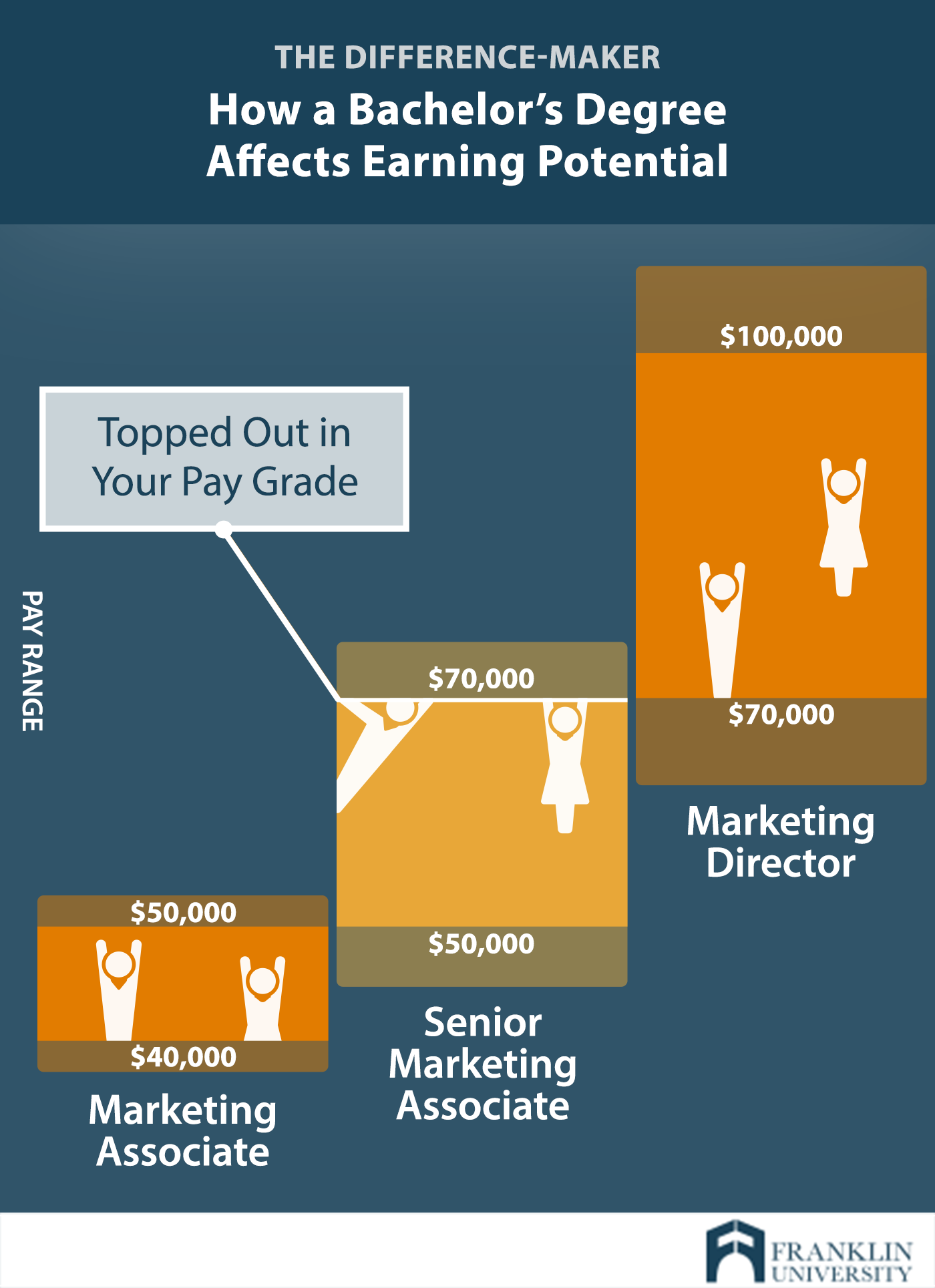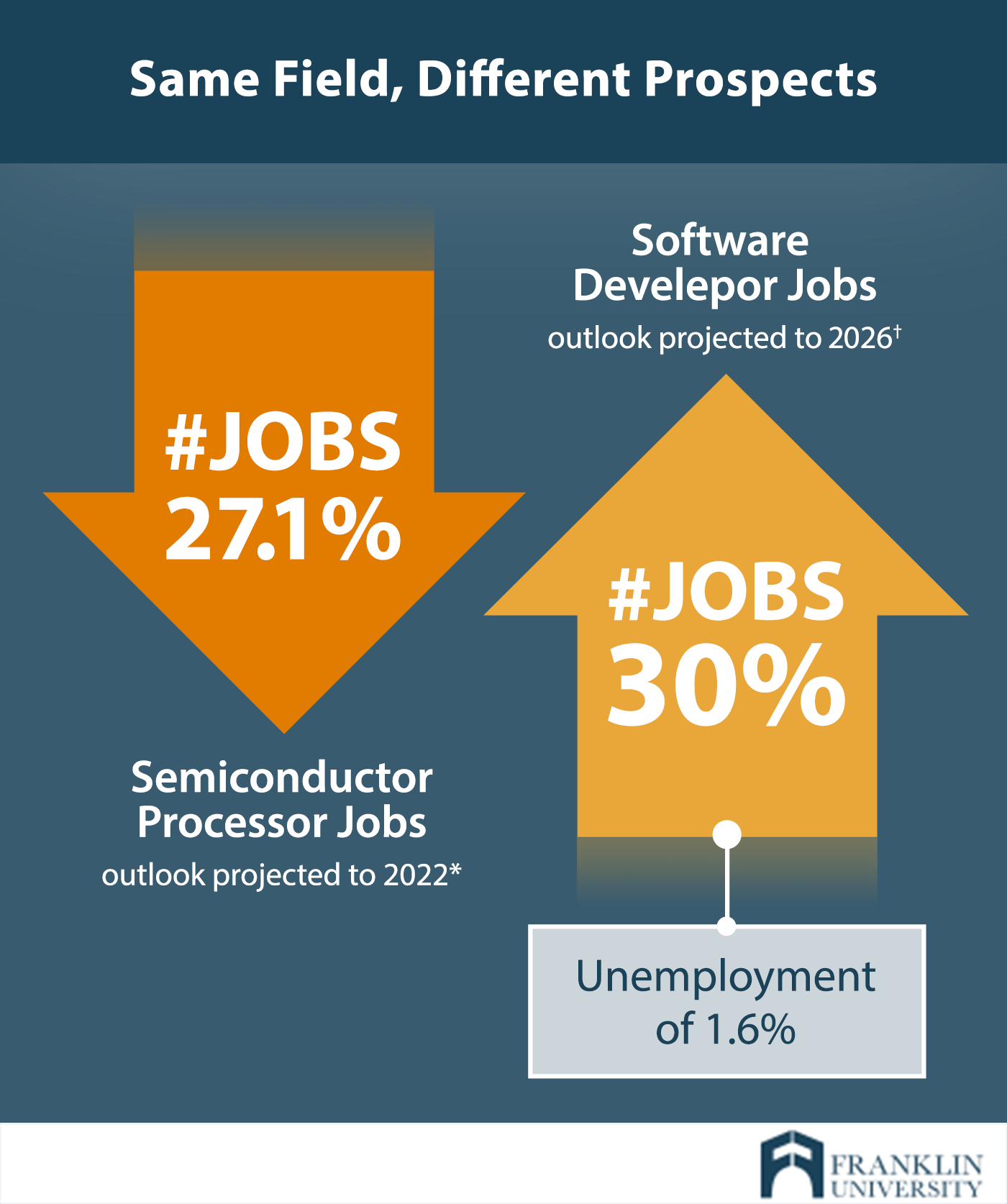Request Information
We're Sorry
There was an unexpected error with the form (your web browser was unable to retrieve some required data from our servers). This kind of error may occur if you have temporarily lost your internet connection. If you're able to verify that your internet connection is stable and the error persists, the Franklin University Help Desk is available to assist you at helpdesk@franklin.edu, 614.947.6682 (local), or 1.866.435.7006 (toll free).
Just a moment while we process your submission.

The Second Bachelor’s Degree: Five Big Whys (and One Master Challenge)
You have your bachelor's degree, and you're well into your career. But something isn't quite right. It might be a matter of salary, advancement, opportunity, or confidence—or even just a feeling that you're not really fulfilled in your work.
Regardless, something has to change.
One strategic way to change it is by getting a second bachelor's degree. Today, more work-experienced adults with a degree are returning to school for a subsequent degree—a degree that may be related, tangential, or even completely unrelated to their first.
Maybe you've thought about a second bachelor's degree, but you're on the fence. Will it be worth it to you? How might it change your career path? Should you go for a master's instead? There are many questions.
It may help for you to start by considering these 5 common reasons why others like you are returning to school.
"Whys" to Consider a Second Bachelor's Degree
1. Meet Requirements You Need to Advance.
Has your career hit a ceiling? Maybe you've topped out in terms of pay or promotions for your current role. If you're successful enough to be crouching at the top of a tall platform that certainly deserves congratulations. But getting to the next level may require a degree that you don’t hold.
For example, let's say a person has a bachelor's degree in English. She used it to get her first job, as a marketing writer. Then, with experience, she became a marketing associate and eventually a senior marketing associate. She's proven herself at the company and she loves her job. But the next level up is the director position, and the company requires a specialized degree in either marketing or business. Unable to apply, she'll lose that promotion to someone else with the right degree. She could move to another career path in the company or go to another employer, but in either case, she'd have to work her way back up again.
She could work with her employer, letting them know that she’s going after the appropriate degree. The second bachelor’s could be the difference maker in her promotion—while preparing her for the new responsibilities that lie ahead. Earning a second bachelor’s degree may be a ceiling buster if you’re looking to move up within your company.

TIP: Many companies offer a tuition reimbursement program to help employees pay for their education. Talk with someone in human resources to see what's available.
When it comes to paying for school, grants are among your best options. But do you know how to find them? Remove the guesswork by downloading this free guide
2. Take a New Career Path
After years of working in one field, you may find yourself in a difficult spot:
- The field is advancing and you need to keep up,
- You lack a growth path for the next step up,
- You’re bored with the status quo and you're looking to take a new path, or
- You’ve been laid off or let go—and you want to build a career in a new, stable industry for tomorrow's workforce
Perhaps your time in your current field has been generally unsatisfying, uninteresting, or not financially rewarding. Regardless of how you reached this point, it's clearly time to take active steps toward another career. It can be a time that's both exciting and daunting.
In many cases, your years of work experience in one field will not mean much to an employer hiring you for an entirely different line of work. Employers may view career switchers with a critical eye, asking questions like: Will they like the work?, Do they know what this field entails? Do they know what it takes to do this job well?, and Will they just leave again for yet another job?
For your next employer, a second degree is powerful, tangible proof of your knowledge in and commitment to the field. By teaching you specific, immediately useful skills you need, it makes you more attractive to employers—and less of a risk than a job applicant without a degree. It may even prevent you from having to start over at the bottom and work your way up.
3. Stay Current and Positioned for Success
Over time, some degrees can grow less important or outdated. It can hurt you in terms of shrinking opportunities, lower pay, tougher competition for the best jobs, or even layoffs. Consider a traditional degree in computing, which has grown outdated, while a related specific degree in cybersecurity is now in high demand. A second bachelor's degree in a similar, thriving industry can help you deftly squeeze your way out of a shrinking field—and apply some of that knowledge toward new opportunities with growth potential.

TIP: Before you go back for that second, related degree, consider the importance of transferred credit from your prior degree. A person working in data processing may already have taken most of the fundamental coursework (general education requirements) and perhaps most of the advanced math courses required for a second degree. Planning ahead with your higher education counselor can save you time, effort, and cost.
4. Grow into a Promotion
A promotion feels great because it says you've mastered your previous role and you're ready for more responsibility. But sometimes getting that promotion moves you away from your existing talents and experience—and throws you into an arena of entirely new skills. You’re suddenly facing new challenges that you’re unprepared to solve.
A common example is nurses who are promoted into administration. Whereas they once managed patient care, now they manage budgets and human resources issues. They're still in the same field and with the same employer, but it's a whole new set of demanding commitments.
When finding yourself in a new position with new and different responsibilities, a second bachelor's degree can help in terms of:
Fast tracking - You could learn on the job, but a degree will fast track your knowledge into an area like finance, economics, or accounting. And that keeps you looking like the right person to promote.
Specialization - A business degree holder might need to specialize in marketing. A communications degree holder might need to specialize in public relations. Perhaps a registered nurse wants to enroll in an RN-to-BSN program to access a whole new cache of well-paying jobs.
5. Get Proper Credit for Your Skills
Have you been doing something as a part of your job, say bookkeeping, but you never really studied it? It happens all the time. You just learned it on the job. You're good at it. And you've been doing it for years.
But two things can happen over time:
- You aren’t getting the benefit of the proper title of "accountant" or the commensurate salary
- Your current employer knows you can do the bookkeeping and accounting, but future employers who look at you will only see an "office manager," meaning you have an under-inflated job title and worth
Getting a second degree can take an area that you already know very well and boost your career standing, giving you legitimate credentials to prove your knowledge.
TIP: Since you already have a lot of experience in the area, there's a chance you can "test out" of some of your coursework. Some schools offer guidance on CLEP (college-level entrance proficiency) exams, which can save you time and effort so you can get your degree faster.
Why a Second Bachelor’s Over a Master’s
Some people will wonder, "If I’m putting in the work and time for a bachelor's, why not just get a master's? Won’t I get the same benefit but with even more clout?" It can be hard to answer the master's question.
The truth is that every person's goals, time availability, and career situation are different. Sometimes a bachelor's degree is the smart option to charge up your career choices. Sometimes, you may want something more.
How a Second Bachelor’s Compares to a Master’s
- Complete in Less Time—For a subsequent bachelor's, consider how much time might be saved via the transfer of credit. A second bachelor’s degree, for instance, generally requires fewer courses in general education, a notable benefit when you’re trying to get in and get out quickly. For a bachelor's program, a student's previous coursework for another degree is more likely to transfer than for a master's program, which has far more rigorous standards.
- Graduate with a Lower Out-of-Pocket Cost—A second bachelor's degree may be lower in price than a master's. Employer-paid tuition reimbursement programs may also drive your decisions, so check into what might be covered.
- Limit the Intensity of Your Studies—Master’s programs are more challenging, and they require an extreme amount of reading, researching, and writing. Think about current commitments in your life and whether you can add a significant challenge to it.
Bachelor's vs. Master's: Course Intensity
There’s a big difference in the type of curriculum between the two programs. To see which is right for you, see the comparison between a Bachelor’s in Accounting and a Master’s in Accounting below.
Bachelor's Curriculum
Focused on helping you develop best practices & tactical skills
Major Focus
- Intermediate Accounting I
- Intermediate Accounting II
- Cost Management
- Federal Income Tax I
- Federal Income Tax II
- Accounting Information Systems
- Auditing
- Accounting Research & Analysis
Major Electives
- Accounting Ethics & Professional Responsibilities
- Fraud Examination
Master's Curriculum
Focused on providing you with analytical skills & application
Core Courses
- Introduction to Research in Accounting
- Financial Accounting Theory
- Management Control Process & Systems
Electives
- Enterprise Resource Planning
- Forensic Accounting
- Advanced Auditing & Data Mining Techniques
- Enterprise Risk Analysis & Management
Only You Can Decide
How will you know if a second bachelor's degree is right for you? Ask yourself a lot of questions. Honestly assess your goals, constraints, and ambitions. By identifying your whys, you can start now toward the best career move for you.





